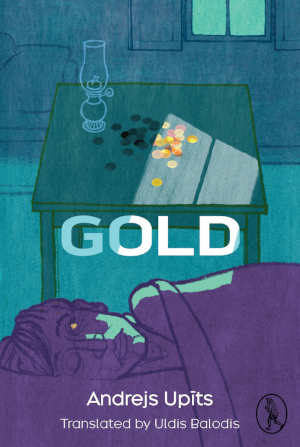Andrejs Upits Gold recensie en informatie roman uit 1914 over Letland onder het tsaristische Russische bewind. Op 16 september 2024 verschijnt bij uitgeverij Vagabond Voices de Engelse vertaling van de roman Zelts van de uit Letland afkomstige schrijver Andrejs Upīts. Hier lees je informatie over de inhoud van de roman, de schrijver, de vertaler en over de uitgave. Een Nederlandse vertaling van de roman uit Letland is niet verkrijgbaar.
Andrejs Upits Gold recensie en informatie
Als er in de media een boekbespreking, review of recensie verschijnt van Gold, de roman uit 1914 van de Letse schrijver Andrejs Upīts, besteden we er op deze pagina aandacht aan.
Gold
- Auteur: Andrejs Upīts (Letland)
- Soort boek: Letse roman
- Origineel: Zelts (1914)
- Engelse vertaling: Uldis Balodis
- Uitgever: Vagabond Voices
- Verschijnt: 16 september 2024
- Omvang: 122 pagina’s
- Uitgave: paperback
- Prijs: £12,50
- Boek bestellen >
Flaptekst van de roman Gold van de Letse schrijver Andejs Upits
Andrejs Upīts’s classic novel Gold, set in Latvia still under Tsarist rule and on the brink of the First World War, is perhaps more topical in recent decades than it has been for a long time. In fact it was dusted off in the 1990s precisely because of its description of how society behaves in untrammelled free markets. The poor and hardworking Sveilis family suddenly inherit great wealth, and this leads them on a journey in which desire and disappointment are always in control, and the author avoids many of the readers’ expectations and all stock narratives.
Upīts is forensic in his naturalistic analysis of a society contending with extremes of both wealth and poverty, and how this is undermining what is left of a moral society. High on a bull market and a flood of quality alcohol, the nouveau riche are in expansive mood but what they experience is not happiness but jaded insatiability ultimately stronger than they are. These hellraisers and presumed winners in the struggle for wealth are the subject of this highly original novel, and the losers are barely mentioned except in its brief first section. The pace and the detailed observation of psychological developments carries readers along through a narrative whose power resides in its lack of moralism. They are left to make their own judgements.

